Abstract
Antisense oligodeoxyribonucleotides targeted to the epidermal growth factor (EGF) receptor were encapsulated into liposomes linked to folate via a polyethylene glycol spacer (folate-PEG-liposomes) and efficiently delivered into cultured KB cells via folate receptor-mediated endocytosis. The oligonucleotides were a phosphodiester 15-mer antisense to the EGF receptor (EGFR) gene stop codon (AEGFR2), the same sequence with three phosphorothioate linkages at each terminus (AEGFR2S), a randomized 15-mer control of similar base composition to AEGFR2 (RC15), a 14-mer control derived from a symmetrized Escherichia coli lac operator (LACM), and the 5'-fluorescein-labeled homologs of several of the above. Cellular uptake of AEGFR2 encapsulated in folate-PEG-liposomes was nine times higher than AEGFR2 encapsulated in nontargeted liposomes and 16 times higher than unencapsulated AEGFR2. Treatment of KB cells with AEGFR2 in folate-PEG-liposomes resulted in growth inhibition and significant morphological changes. Curiously, AEGFR2 and AEGFR2S encapsulated in folate-PEG-liposomes exhibited virtually identical growth inhibitory effects, reducing KB cell proliferation by > 90% 48 hr after the cells were treated for 4 hr with 3 microM oligonucleotide. Free AEGFR2 caused almost no growth inhibition, whereas free AEGFR2S was only one-fifth as potent as the folate-PEG-liposome-encapsulated oligonucleotide. Growth inhibition of the oligonucleotide-treated cells was probably due to reduced EGFR expression because indirect immunofluorescence staining of the cells with a monoclonal antibody against the EGFR showed an almost quantitative reduction of the EGFR in cells treated with folate-PEG-liposome-entrapped AEGFR2. These results suggest that antisense oligonucleotide encapsulation in folate-PEG-liposomes promise efficient and tumor-specific delivery and that phosphorothioate oligonucleotides appear to offer no major advantage over native phosphodiester DNA when delivered by this route.
Full text
PDF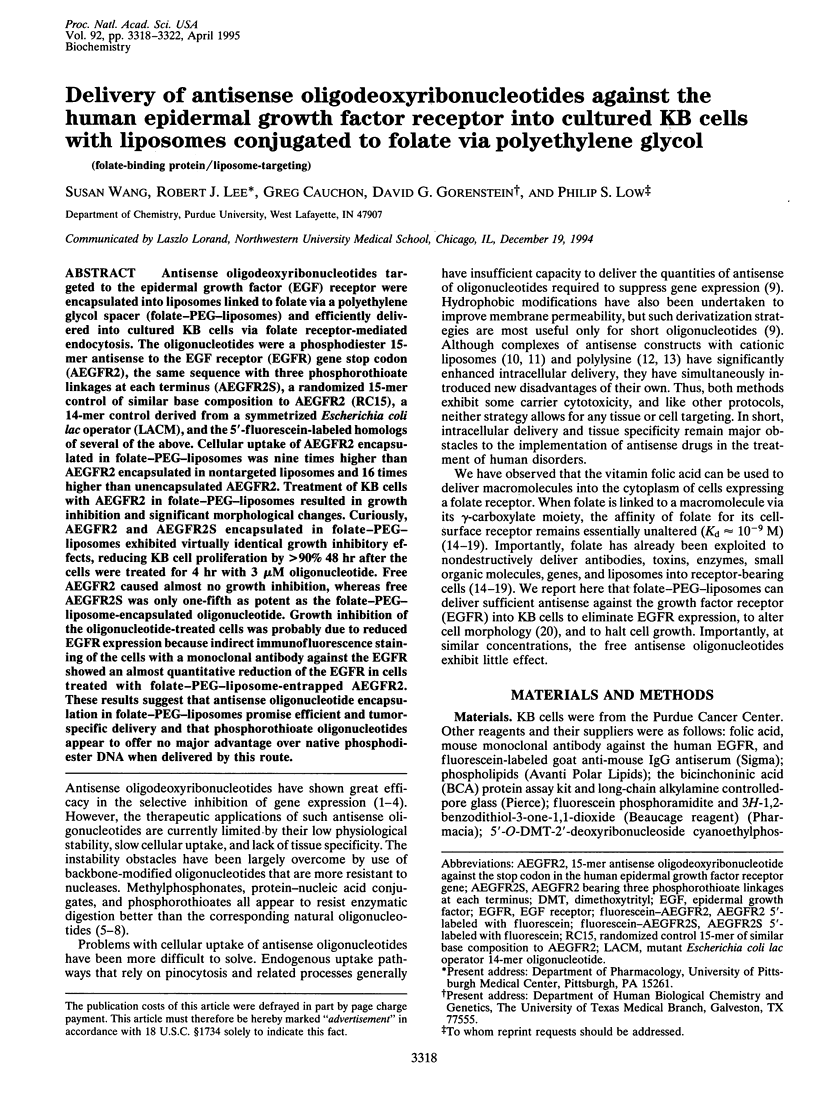
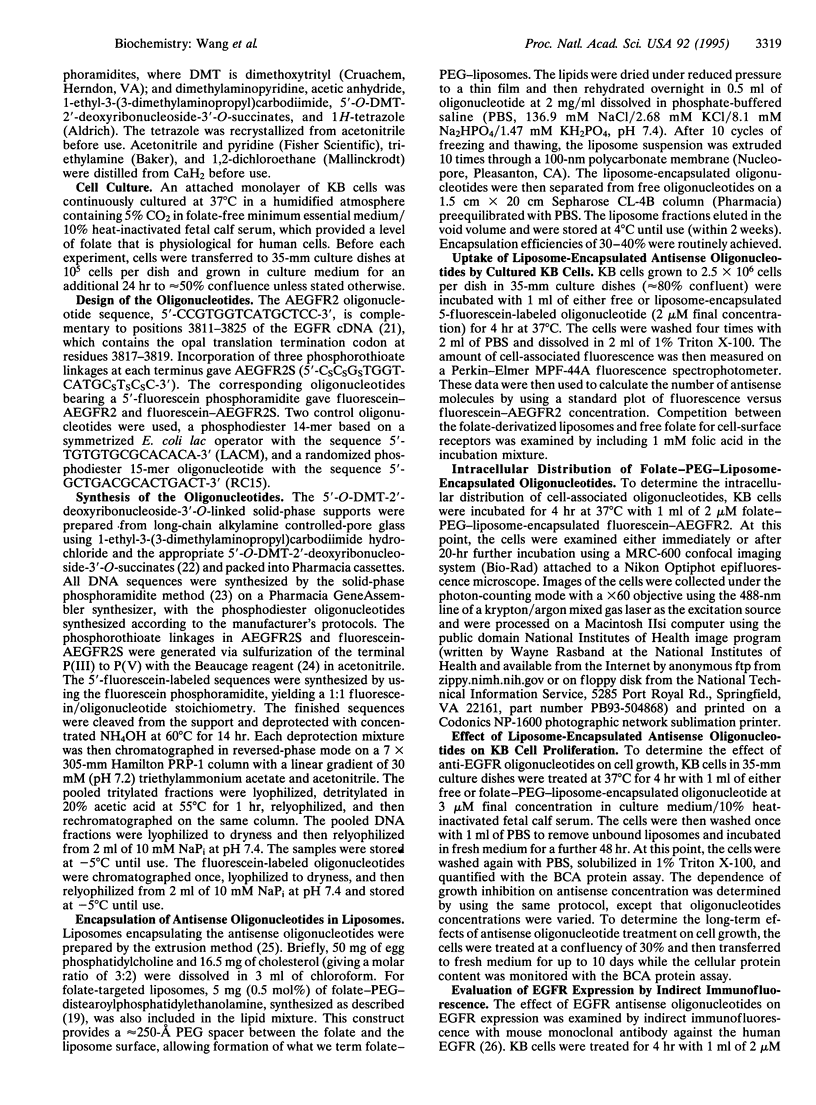
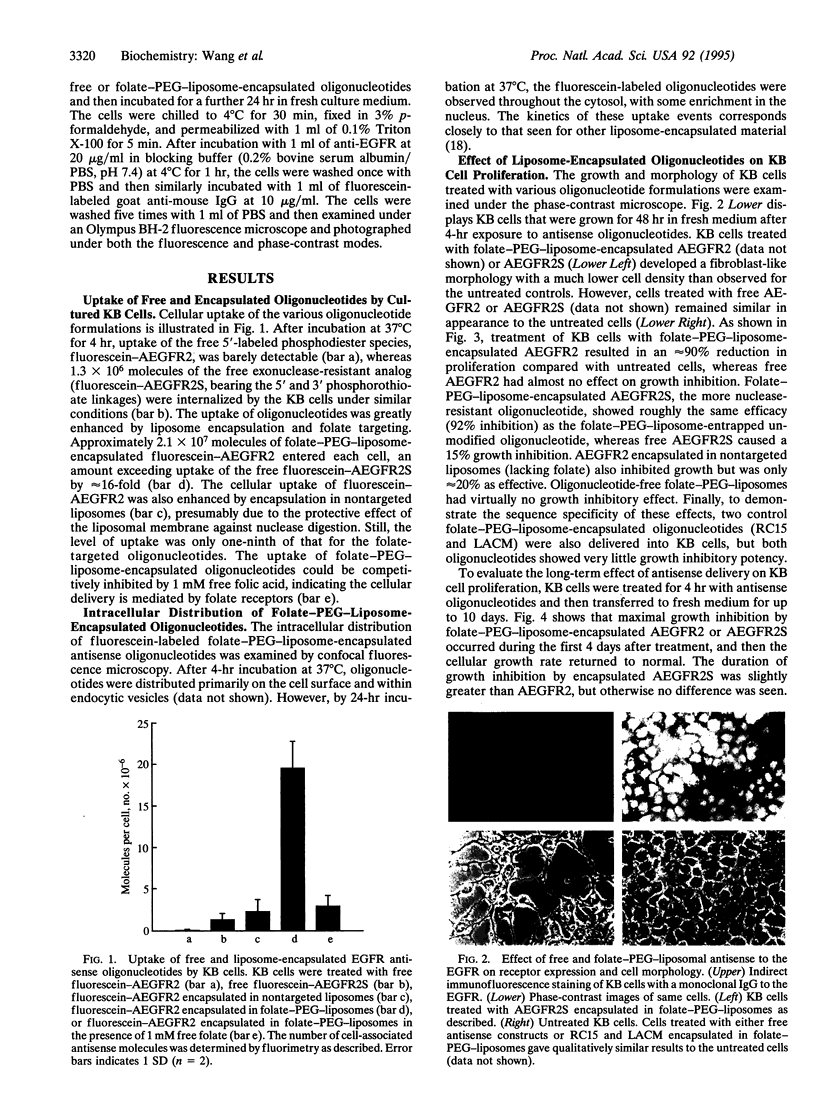
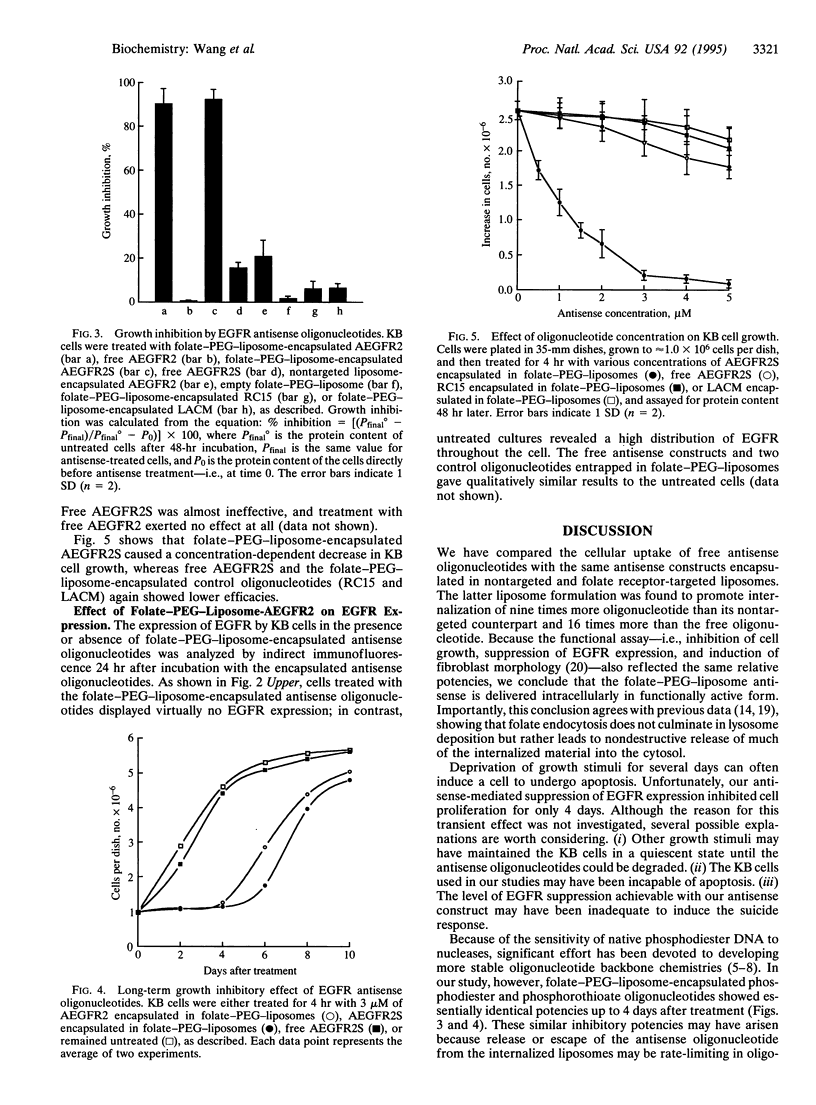
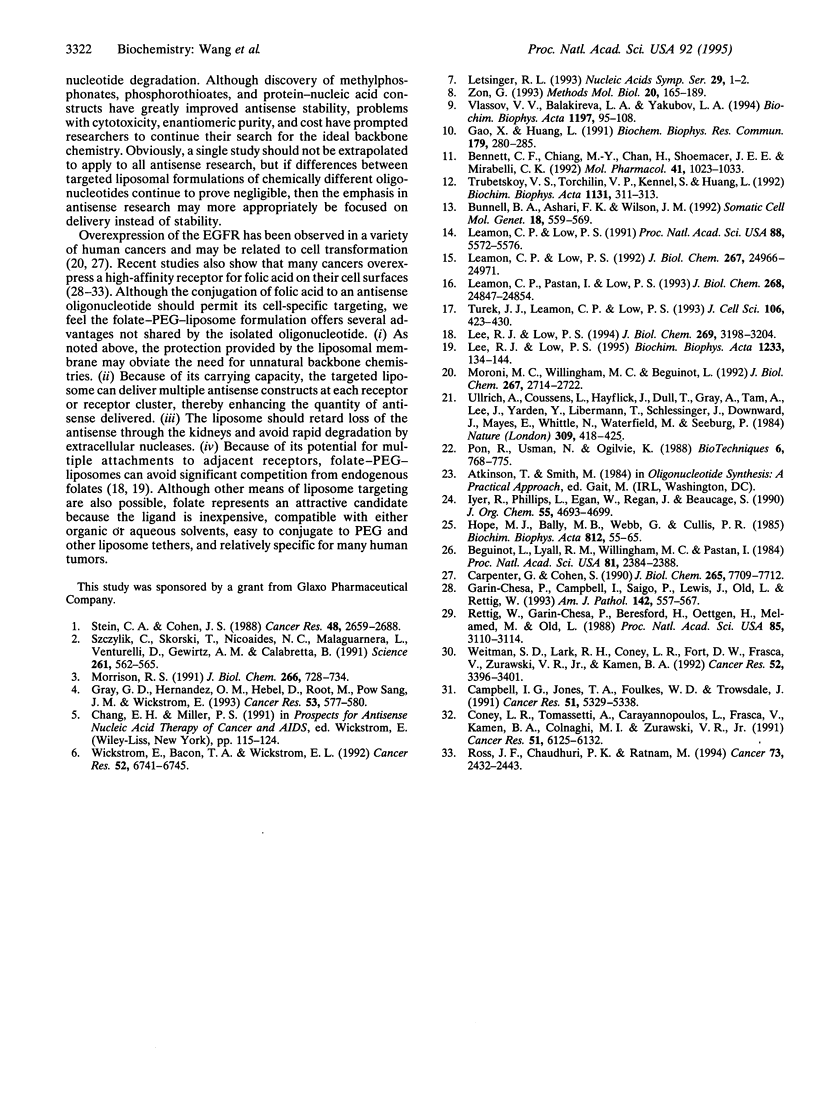
Images in this article
Selected References
These references are in PubMed. This may not be the complete list of references from this article.
- Beguinot L., Lyall R. M., Willingham M. C., Pastan I. Down-regulation of the epidermal growth factor receptor in KB cells is due to receptor internalization and subsequent degradation in lysosomes. Proc Natl Acad Sci U S A. 1984 Apr;81(8):2384–2388. doi: 10.1073/pnas.81.8.2384. [DOI] [PMC free article] [PubMed] [Google Scholar]
- Bennett C. F., Chiang M. Y., Chan H., Shoemaker J. E., Mirabelli C. K. Cationic lipids enhance cellular uptake and activity of phosphorothioate antisense oligonucleotides. Mol Pharmacol. 1992 Jun;41(6):1023–1033. [PubMed] [Google Scholar]
- Bunnell B. A., Askari F. K., Wilson J. M. Targeted delivery of antisense oligonucleotides by molecular conjugates. Somat Cell Mol Genet. 1992 Nov;18(6):559–569. doi: 10.1007/BF01232652. [DOI] [PubMed] [Google Scholar]
- Campbell I. G., Jones T. A., Foulkes W. D., Trowsdale J. Folate-binding protein is a marker for ovarian cancer. Cancer Res. 1991 Oct 1;51(19):5329–5338. [PubMed] [Google Scholar]
- Carpenter G., Cohen S. Epidermal growth factor. J Biol Chem. 1990 May 15;265(14):7709–7712. [PubMed] [Google Scholar]
- Coney L. R., Tomassetti A., Carayannopoulos L., Frasca V., Kamen B. A., Colnaghi M. I., Zurawski V. R., Jr Cloning of a tumor-associated antigen: MOv18 and MOv19 antibodies recognize a folate-binding protein. Cancer Res. 1991 Nov 15;51(22):6125–6132. [PubMed] [Google Scholar]
- Gao X., Huang L. A novel cationic liposome reagent for efficient transfection of mammalian cells. Biochem Biophys Res Commun. 1991 Aug 30;179(1):280–285. doi: 10.1016/0006-291x(91)91366-k. [DOI] [PubMed] [Google Scholar]
- Garin-Chesa P., Campbell I., Saigo P. E., Lewis J. L., Jr, Old L. J., Rettig W. J. Trophoblast and ovarian cancer antigen LK26. Sensitivity and specificity in immunopathology and molecular identification as a folate-binding protein. Am J Pathol. 1993 Feb;142(2):557–567. [PMC free article] [PubMed] [Google Scholar]
- Gray G. D., Hernandez O. M., Hebel D., Root M., Pow-Sang J. M., Wickstrom E. Antisense DNA inhibition of tumor growth induced by c-Ha-ras oncogene in nude mice. Cancer Res. 1993 Feb 1;53(3):577–580. [PubMed] [Google Scholar]
- Leamon C. P., Low P. S. Cytotoxicity of momordin-folate conjugates in cultured human cells. J Biol Chem. 1992 Dec 15;267(35):24966–24971. [PubMed] [Google Scholar]
- Leamon C. P., Low P. S. Delivery of macromolecules into living cells: a method that exploits folate receptor endocytosis. Proc Natl Acad Sci U S A. 1991 Jul 1;88(13):5572–5576. doi: 10.1073/pnas.88.13.5572. [DOI] [PMC free article] [PubMed] [Google Scholar]
- Leamon C. P., Pastan I., Low P. S. Cytotoxicity of folate-Pseudomonas exotoxin conjugates toward tumor cells. Contribution of translocation domain. J Biol Chem. 1993 Nov 25;268(33):24847–24854. [PubMed] [Google Scholar]
- Lee R. J., Low P. S. Delivery of liposomes into cultured KB cells via folate receptor-mediated endocytosis. J Biol Chem. 1994 Feb 4;269(5):3198–3204. [PubMed] [Google Scholar]
- Lee R. J., Low P. S. Folate-mediated tumor cell targeting of liposome-entrapped doxorubicin in vitro. Biochim Biophys Acta. 1995 Feb 15;1233(2):134–144. doi: 10.1016/0005-2736(94)00235-h. [DOI] [PubMed] [Google Scholar]
- Letsinger R. L. Control of properties of oligonucleotides by chemical modifications. Nucleic Acids Symp Ser. 1993;(29):1–2. [PubMed] [Google Scholar]
- Moroni M. C., Willingham M. C., Beguinot L. EGF-R antisense RNA blocks expression of the epidermal growth factor receptor and suppresses the transforming phenotype of a human carcinoma cell line. J Biol Chem. 1992 Feb 5;267(4):2714–2722. [PubMed] [Google Scholar]
- Morrison R. S. Suppression of basic fibroblast growth factor expression by antisense oligodeoxynucleotides inhibits the growth of transformed human astrocytes. J Biol Chem. 1991 Jan 15;266(2):728–734. [PubMed] [Google Scholar]
- Pon R. T., Usman N., Ogilvie K. K. Derivatization of controlled pore glass beads for solid phase oligonucleotide synthesis. Biotechniques. 1988 Sep;6(8):768–775. [PubMed] [Google Scholar]
- Rettig W. J., Garin-Chesa P., Beresford H. R., Oettgen H. F., Melamed M. R., Old L. J. Cell-surface glycoproteins of human sarcomas: differential expression in normal and malignant tissues and cultured cells. Proc Natl Acad Sci U S A. 1988 May;85(9):3110–3114. doi: 10.1073/pnas.85.9.3110. [DOI] [PMC free article] [PubMed] [Google Scholar]
- Ross J. F., Chaudhuri P. K., Ratnam M. Differential regulation of folate receptor isoforms in normal and malignant tissues in vivo and in established cell lines. Physiologic and clinical implications. Cancer. 1994 May 1;73(9):2432–2443. doi: 10.1002/1097-0142(19940501)73:9<2432::aid-cncr2820730929>3.0.co;2-s. [DOI] [PubMed] [Google Scholar]
- Stein C. A., Cohen J. S. Oligodeoxynucleotides as inhibitors of gene expression: a review. Cancer Res. 1988 May 15;48(10):2659–2668. [PubMed] [Google Scholar]
- Szczylik C., Skorski T., Nicolaides N. C., Manzella L., Malaguarnera L., Venturelli D., Gewirtz A. M., Calabretta B. Selective inhibition of leukemia cell proliferation by BCR-ABL antisense oligodeoxynucleotides. Science. 1991 Aug 2;253(5019):562–565. doi: 10.1126/science.1857987. [DOI] [PubMed] [Google Scholar]
- Trubetskoy V. S., Torchilin V. P., Kennel S., Huang L. Cationic liposomes enhance targeted delivery and expression of exogenous DNA mediated by N-terminal modified poly(L-lysine)-antibody conjugate in mouse lung endothelial cells. Biochim Biophys Acta. 1992 Jul 15;1131(3):311–313. doi: 10.1016/0167-4781(92)90030-4. [DOI] [PubMed] [Google Scholar]
- Turek J. J., Leamon C. P., Low P. S. Endocytosis of folate-protein conjugates: ultrastructural localization in KB cells. J Cell Sci. 1993 Sep;106(Pt 1):423–430. doi: 10.1242/jcs.106.1.423. [DOI] [PubMed] [Google Scholar]
- Ullrich A., Coussens L., Hayflick J. S., Dull T. J., Gray A., Tam A. W., Lee J., Yarden Y., Libermann T. A., Schlessinger J. Human epidermal growth factor receptor cDNA sequence and aberrant expression of the amplified gene in A431 epidermoid carcinoma cells. 1984 May 31-Jun 6Nature. 309(5967):418–425. doi: 10.1038/309418a0. [DOI] [PubMed] [Google Scholar]
- Vlassov V. V., Balakireva L. A., Yakubov L. A. Transport of oligonucleotides across natural and model membranes. Biochim Biophys Acta. 1994 Jun 29;1197(2):95–108. doi: 10.1016/0304-4157(94)90001-9. [DOI] [PubMed] [Google Scholar]
- Weitman S. D., Lark R. H., Coney L. R., Fort D. W., Frasca V., Zurawski V. R., Jr, Kamen B. A. Distribution of the folate receptor GP38 in normal and malignant cell lines and tissues. Cancer Res. 1992 Jun 15;52(12):3396–3401. [PubMed] [Google Scholar]
- Wickstrom E., Bacon T. A., Wickstrom E. L. Down-regulation of c-MYC antigen expression in lymphocytes of Emu-c-myc transgenic mice treated with anti-c-myc DNA methylphosphonates. Cancer Res. 1992 Dec 15;52(24):6741–6745. [PubMed] [Google Scholar]
- Zon G. Oligonucleoside phosphorothioates. Methods Mol Biol. 1993;20:165–189. doi: 10.1385/0-89603-281-7:165. [DOI] [PubMed] [Google Scholar]



